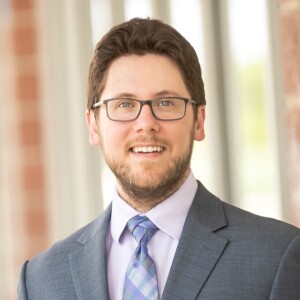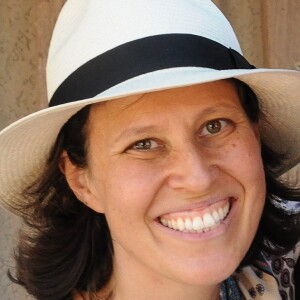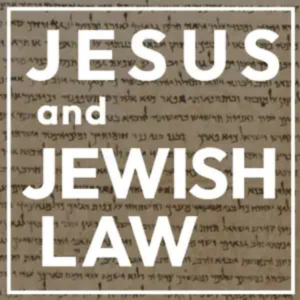The Biblical Mind
The Biblical Mind is dedicated to helping its audience understand how the biblical authors thought, promoting Bible fluency through curious, careful reading of Scripture. It is hosted by Dr. Dru Johnson and published by the Center for Hebraic Thought, a hub for research and resources on the intellectual world of the Bible.
The Biblical Mind is dedicated to helping its audience understand how the biblical authors thought, promoting Bible fluency through curious, careful reading of Scripture. It is hosted by Dr. Dru Johnson and published by the Center for Hebraic Thought, a hub for research and resources on the intellectual world of the Bible.
Episodes

Thursday May 29, 2025
Thursday May 29, 2025
What if our biggest biblical misunderstandings come from reading the right words in the wrong way? In this episode, Old Testament scholar Dr. Andy Judd joins Dru Johnson to unravel the complex and often misused concept of genre in biblical interpretation. Drawing from his background in English literature and law, Dr. Judd explains how many theological debates, misreadings, and even dangerous interpretations arise not from misused Hebrew dictionaries—but from unspoken assumptions about genre.
Why do readers assume Abraham’s behavior is exemplary? Why do sermons treat biblical laws like modern legal codes? Why do people interpret apocalyptic visions as historical predictions? From Genesis to Judges, Paul’s letters to Revelation, Judd shows that failing to ask, “What kind of text is this?” is often where interpretation goes off the rails.
Blending humor, literary theory, and deep biblical insight, Judd offers practical ways to become better “travelers” in the ancient biblical world—learning to coordinate with texts the way we coordinate with traffic rules in a new country.
Andy Judd's personal website can be found here:https://www.andyjudd.com/
We are listener supported. Give to the cause here:https://hebraicthought.org/give
For more articles:https://thebiblicalmind.org/
Social Links:Facebook: https://www.facebook.com/HebraicThoughtInstagram: https://www.instagram.com/hebraicthoughtThreads: https://www.threads.net/hebraicthoughtX: https://www.twitter.com/HebraicThoughtBluesky: https://bsky.app/profile/hebraicthought.org
Chapters:00:00 Introduction00:54 The Journey into Genre Studies03:26 Misinterpretations and Conflicts in Biblical Genre06:26 Understanding Narrative and Ethical Frameworks10:18 The Role of Genre in Biblical Interpretation12:39 Defining Genre: Conventions and Contexts14:37 Cultural Contexts and Genre Navigation18:35 The Boomerang Test: A Practical Approach to Genre24:32 Deep Structures and Genre Regulation28:08 Understanding Genre in Scripture33:54 The Role of Genre in Biblical Interpretation39:22 Biblical Law: A Unique Genre43:56 The Social Function of Biblical Law49:42 Wisdom and the Interpretation of Law

Thursday May 22, 2025
Thursday May 22, 2025
Is loving your family first a biblical idea—or a betrayal of Jesus’ call to love your neighbor? In this thought-provoking episode, Mike Tolliver—Executive Director of the Center for Hebraic Thought—joins Dru Johnson to explore his developing PhD thesis on Storge (family love), the kinsman-redeemer, and what biblical justice actually looks like.
Drawing on Torah, philosophy, and early Christian texts, Mike argues that Storge love is not only natural—it’s essential to a functioning society, and that Israel’s family-based justice system was designed to eliminate categories like “orphan” and “widow.” He explores why Paul uses the metaphor of adoption—and not kinsman-redeemer—for Gentile inclusion, and why the Ten Commandments are saturated with family ethics.
From Sophie's Choice-style sermon illustrations to questions about circumcision, baptism, and ethnic election, this episode unpacks the implications of what it means to love your kin without devaluing the stranger.
As Mike prepares for PhD work, his big question is: What does rightly ordered family love look like in Scripture—and what happens when it gets misordered?
We are listener supported. Give to the cause here: https://hebraicthought.org/give
For more articles:https://thebiblicalmind.org/
Social Links:Facebook: https://www.facebook.com/HebraicThoughtInstagram: https://www.instagram.com/hebraicthoughtThreads: https://www.threads.net/hebraicthoughtX: https://www.twitter.com/HebraicThoughtBluesky: https://bsky.app/profile/hebraicthought.org
Chapters:
00:00 Exploring Academic Pursuits and Career Paths05:47 The Kinsman Redeemer: A Social Safety Net14:35 Storge and Kinsman Redeemer in Biblical Context19:54 Theological Implications of Kinship and Election27:34 Exploring the Promise of Descendancy29:03 Navigating the Path to a PhD30:56 The Challenge of Proposal Writing31:57 Understanding Storge in Hebraic Thought39:07 The Role of Storge in the Ten Commandments41:07 Stranger Love vs. Family Love43:55 Moral Dilemmas in Love49:56 The Future of Intergenerational Family Focus

Thursday May 15, 2025
Thursday May 15, 2025
What does it mean to call something “Christian music”? Nick Barré has spent decades in the music industry—from working at EMI with early Switchfoot to managing major names like Casting Crowns, KB, Brandon Heath, and more. In this 200th episode of The Biblical Mind, he joins Dru Johnson to reflect on the Christian music label, the tension between calling and category, and how artists navigate faith and fame.
Nick argues that labeling music—or restaurants or plumbers—as “Christian” may do more harm than good. He shares why genre categories are a business necessity but spiritually unhelpful, and why the most important questions artists must answer are about calling, audience, and identity—not chart placement.
From spiritual burnout to public affirmation, from the temptations of platform to the dangers of envy, Nick shares pastoral, industry-hardened wisdom on how to guide artists into longevity and spiritual wholeness. He even offers advice for aspiring Christian musicians—and what it really means to “show, not tell” when pursuing a creative calling.
Nick Barre's Company "Proper Management" can be found here:
https://www.propermanagement.net
We are listener supported. Give to the cause here:https://hebraicthought.org/give
For more articles:https://thebiblicalmind.org/
Social Links:Facebook: https://www.facebook.com/HebraicThoughtInstagram: https://www.instagram.com/hebraicthoughtThreads: https://www.threads.net/hebraicthoughtX: https://www.twitter.com/HebraicThoughtBluesky: https://bsky.app/profile/hebraicthought.org
Chapters:00:00 Defining Christian Music03:11 The Evolution of Music Genres06:10 Navigating the Music Industry08:57 The Dangers of Labeling12:09 The Role of Artists in Ministry15:16 The Impact of Fame on Identity18:24 Identifying Unique Gifts in Artists25:41 Exploring Diverse Artist Portfolios28:29 Navigating Hard Conversations in the Music Industry31:05 Defining Success in the Arts33:15 The Challenge of Artistic Compromise37:06 Understanding Market Dynamics in Music40:22 Fragmentation of the Music Industry46:39 Advice for Aspiring Christian Artists

Thursday May 08, 2025
Thursday May 08, 2025
In this episode, Dr. Dru Johnson sits down with Matt Whitman, host of The Ten Minute Bible Hour, to explore why so many Christians—and skeptics—struggle with Scripture. Whitman shares what he’s learned from engaging millions online: people are often afraid to be wrong, shaped by graceless experiences in church and cancel culture in the wider world. The solution? Modeling curiosity, empathy, and intellectual humility.
Whitman opens up about his own faith journey, the impact of church hurt, and why he makes space for disagreement and exploration in his content. From deconstructing popular biblical themes to highlighting the beauty of traditions outside his own, Matt argues that deep scriptural engagement thrives in environments where it’s okay not to have all the answers.
Together, Dru and Matt delve into themes like biblical coherence, the importance of interpretive grace, and what it means to approach the Bible not as experts, but as learners. Their conversation models the very ethos they preach: thoughtful, generous dialogue rooted in the belief that God’s grace extends to our minds—not just our sins.
For More of Matt Whitman and the Ten Minute Bible Hour: https://www.youtube.com/@UC3vIOVJiXigzVDA2TYqaa0Qhttps://www.facebook.com/thetenminutebiblehourhttps://www.instagram.com/tenminutebiblehourhttps://www.twitter.com/MattWhitmanTMBHhttps://www.threads.com/@mattwhitmantmbh
We are listener supported. Give to the cause here:https://hebraicthought.org/give
For more articles:https://thebiblicalmind.org/
Social Links:Facebook: https://www.facebook.com/HebraicThoughtInstagram: https://www.instagram.com/hebraicthoughtThreads: https://www.threads.net/hebraicthoughtX: https://www.twitter.com/HebraicThoughtBluesky: https://bsky.app/profile/hebraicthought.org
Chapters:00:00 Introduction00:54 Resistance to the Bible and Church Experiences04:57 Cultural Resistance and Historical Context07:44 Navigating Hurt and Church Experiences10:56 Empathy and Understanding in Conversations14:21 Normalizing Being Wrong17:20 Internal Cohesion in Christianity25:38 Universal Themes in the Bible32:44 Navigating Biblical Interpretation and Truth35:43 The Complexity of Biblical Truth37:55 The Pressure of Pastoral Performance42:14 The Challenge of Authenticity in Teaching45:32 Modeling Intellectual Grace and Humility49:40 Creating a Gracious Learning Environment53:16 The Nature of Knowledge and Learning in Faith

Thursday May 01, 2025
Thursday May 01, 2025
What happens when science, religion, and education collide? In this episode, Dr. Rachel Pear shares her remarkable journey from growing up in New York’s modern Orthodox Jewish community to researching how evolution is taught and received across Israeli society.
A scholar of science education and prehistoric archaeology, Rachel discusses how Jewish, Christian, and Muslim communities in Israel grapple differently with the question of human origins. Why do some teachers avoid the topic altogether? Why do secular and religious students draw such hard lines around what’s “acceptable” to believe? And how do family, community, and national identity shape scientific acceptance?
Rachel also shares her experience presenting three distinct rabbinic views on evolution in schools, showing students that Jewish thought isn’t monolithic—and that questioning is part of the tradition. She explores the cultural weight of science, the legacy of eugenics, and how educators can create space for real dialogue in science classrooms.
Whether you’re an educator, a religious thinker, or just curious about how evolution meets identity, this episode offers a rich, honest look at a complex conversation that’s still evolving.
We are listener supported. Give to the cause here:https://hebraicthought.org/give
For more articles:https://thebiblicalmind.org/
Social Links:Facebook: https://www.facebook.com/HebraicThought/ Instagram: https://www.instagram.com/hebraicthought/ Threads: https://www.threads.net/hebraicthought/ X: https://www.twitter.com/HebraicThought/ Bluesky: https://bsky.app/profile/hebraicthought.org
Chapters:
00:00 Introduction to Rachel's Journey02:49 Exploring Prehistoric Archaeology and Cultural Contexts05:48 The Intersection of Evolution and Religion08:48 Cultural Perspectives on Evolution in Israel11:57 The Role of Education in Science and Religion14:57 Diverse Views on Evolution in Arab Schools17:58 The Complexity of Science and Cultural Identity20:50 Reflections on Science, Culture, and Religion27:27 Navigating Values in Education32:20 The Complexity of Teaching Evolution35:53 Epistemology and the Scientific Method40:51 Cultural Perspectives on Evolution45:32 The Intersection of Tradition and Modernity

Thursday Apr 24, 2025
Thursday Apr 24, 2025
Is the relationship between Islam and science as well-developed as it is in Christianity? Not even close—but that’s changing. In this episode, Dr. Shoaib Ahmed Malik, Lecturer in Science and Religion at the University of Edinburgh, joins Dru Johnson to share the emerging field of Islam and science, focusing on the hot topic of evolution.
Shoaib unpacks the historical development of Islamic engagement with science, tracing it from early encounters with Western scientific frameworks to the present. He explains why the Islamic world lacks infrastructure like textbooks, academic chairs, and journals for the science-religion conversation—and why that’s finally beginning to change.
But what about evolution? Shoaib shares why it remains a highly sensitive subject in Muslim-majority countries (including stories of professors losing jobs over it) and how Muslim views differ from Christian ones, especially around original sin, Adam, and human suffering.
This is an honest, fascinating look at how Muslims are navigating modern science, why cultural and religious taboos persist, and how Shoaib’s work is shaping new conversations at the intersection of Islamic theology and science.
We are listener supported. Give to the cause here:https://hebraicthought.org/give
For more articles:https://thebiblicalmind.org/
Social Links:Facebook: https://www.facebook.com/HebraicThought/ Instagram: https://www.instagram.com/hebraicthought/ Threads: https://www.threads.net/hebraicthought/ X: https://www.twitter.com/HebraicThought/ Bluesky: https://bsky.app/profile/hebraicthought.org
Chapters:
00:00 Introduction to Shoaib Ahmed Malik's Journey03:11 Transition from Engineering to Humanities06:00 Teaching Experience in the UAE09:14 Pursuing Philosophy, Science, and Religion12:18 Publishing and Academic Recognition15:11 Navigating Career Changes and New Opportunities18:29 Exploring Science and Religion Conversations26:43 Navigating Conversations with Students27:29 Understanding Islam: Sunni vs Shia30:19 The Contemporary Muslim World: Sunni and Shia Dynamics31:34 The Intellectual History of Islam35:17 Muslim Perspectives on Science and Religion39:01 Islamization of Science: A Discourse Emerges42:48 The Development of Islamic Science Education44:25 Evolution and Its Reception in the Muslim World48:11 Unique Questions Muslims Ask About Evolution

Thursday Apr 17, 2025
Thursday Apr 17, 2025
What happens when you put 15 scholars—scientists and theologians, Muslim, Jewish, and Christian—in a room to talk about creation? In this episode of The Biblical Mind Podcast, Dr. Dru Johnson shares his experience launching the Abrahamic Theistic Origins Project in Oxford.
Far from being a formal academic conference, the gathering focused on “enduring collegial co-learning”—building trust and curiosity across disciplines and faith traditions. The participants explored how evolutionary biology, genetics, astrophysics, and artificial intelligence intersect with theological questions about human uniqueness, creation, and divine action.
Dru explains why religious identity didn’t hinder the conversation—it enriched it, and why the bigger challenge was translating between scientists and theologians. He also shares a fascinating insight on Neanderthals and menopause, and how that single biological feature opens a window into intergenerational care, legacy, and biblical values.
The project raises bold questions: Can we build a biblical philosophy of science? Does Hebraic thought inform scientific methods? And what does it look like to think with Scripture—not just about it—in a scientific age?
We are listener supported. Give to the cause here:https://hebraicthought.org/give
For more articles:https://thebiblicalmind.org/
Social Links:Facebook: https://www.facebook.com/HebraicThought/Instagram: https://www.instagram.com/hebraicthought/Threads: https://www.threads.net/hebraicthought/X: https://www.twitter.com/HebraicThought/Bluesky: https://bsky.app/profile/hebraicthought.org
Chapters
00:00 Exploring Creation Theology and Science 02:58 Building Collegial Relationships Among Scholars 05:43 Navigating Interfaith Dialogues 08:52 Understanding Diverse Perspectives on Origins 13:59 The Intersection of Science and Theistic Beliefs 21:40 Christian Views on Human Origins 30:08 Pragmatism and Empiricism in Biblical Thought

Thursday Apr 10, 2025
Syndicated: Jesus and Jewish Law (Logan Williams and Paul Sloan) Ep. #195
Thursday Apr 10, 2025
Thursday Apr 10, 2025
Was the Mosaic Law a burdensome set of rules meant to be broken? Did Jesus overthrow the Torah—or fulfill it? In this special episode of The Biblical Mind Podcast, we revisit the pilot episode of the Jesus and the Jewish Law podcast, hosted by Paul Sloan and Logan Williams. Together, they walk through seven widespread misconceptions about the Law and how these misunderstandings distort our reading of both the Old and New Testaments.
You’ll hear why the Law was never meant to be a ladder to earn salvation, how it was designed to maintain God’s presence among His people, and why ritual purity doesn’t equal sin. They also explore the difference between distinction and exclusion, how the Law does not uniformly obligate all humans, and how Jesus builds on—not breaks—the Torah’s ethical depth.
If you’ve ever wrestled with questions about the sacrificial system, purity laws, Gentile inclusion, or what Jesus really meant in the Sermon on the Mount, this episode offers a clear, accessible, and richly Hebraic guide to reading the Law like Jesus did.
Jesus and Jewish Law Podcast:Apple = https://podcasts.apple.com/us/podcast/jesus-and-jewish-law/id1791111864
Spotify = https://open.spotify.com/show/1QCKgVOnEmtfFwRQtWlBSV
We are listener supported. Give to the cause here:https://hebraicthought.org/give
For more articles:https://thebiblicalmind.org/
Social Links:Facebook: https://www.facebook.com/HebraicThought/Instagram: https://www.instagram.com/hebraicthought/Threads: https://www.threads.net/hebraicthought/X: https://www.twitter.com/HebraicThought/Bluesky: https://bsky.app/profile/hebraicthought.org
Chapters
00:00 Introduction02:01 Misconceptions About the Law: An Overview05:57 Debunking Misconceptions: The Nature of the Law12:08 Understanding Impurity and Its Implications17:59 The Role of Sacrifice in the Law20:02 Conclusion and Future Topics

Thursday Apr 03, 2025
Thursday Apr 03, 2025
This episode was originally published on November 11, 2022. We thought it was worth a reissue for our newer listeners.
Christianity is a truly global religion, and every strand of Christianity has its own theological emphases. Western Christians tend to focus on individual salvation and the question of what happens when we die. But as we amplify other Christian voices, we find that the riches of the gospel might stretch far beyond our original conceptions.
In this episode, Dru interviews Dr. Jangkholam Haokip, an Indian theologian, author, and former professor. Growing up in Churachandpur, Manipur, in Northeast India, Jangkholam converted to Christianity as a child. Drawing on his experiences with indigenous Indian culture and religion, he had the opportunity to develop a unique perspective on Christian theology, including Scripture's portrayal of sin's effects on nature, the value of yet-unheard perspectives, and the way that the gospels can affect the lives of whole communities.
After his long career as a professor at Union Biblical Seminary in India, Jangkholam has founded the Bethesda-Khankho Foundation, which aims to transform indigenous Indian communities through education and poverty outreach. He also contributed to the recent book Voices from the Margins: Wisdom of Primal Peoples in the Era of World Christianity.
For More of Jangkholam Haokip Content:https://jlamboihaokip.wordpress.com/
https://langhamliterature.org/author-bio?author_id=5923
We are listener supported. Give to the cause here:https://hebraicthought.org/give
For more articles:https://thebiblicalmind.org/
Social Links:Facebook: https://www.facebook.com/HebraicThought/Instagram: https://www.instagram.com/hebraicthought/Threads: https://www.threads.net/hebraicthought/X: https://www.twitter.com/HebraicThought/Bluesky: https://bsky.app/profile/hebraicthought.org
Show notes:
0:00 Introduction
1:22 Converting to Christianity
5:03 Further education and understanding the gospel
8:51 Individualism in Western Christianity
15:09 Sin and the health of nature
20:10 Tribal Indian thought in the biblical texts and Western theology
25:48 The value of indigenous theology
29:47 Christianity as a help for Indian history, identity, and culture
31:05 On Jangkholam's new book Voices from the Margins: Wisdom of Primal Peoples in the Era of World Christianity

Thursday Mar 27, 2025
Thursday Mar 27, 2025
Is God emotionless and unchanging? Many systematic theologians have long argued that God is completely impassible—meaning He cannot feel, suffer, or be influenced by creation. But is this truly what the Bible teaches?
In this episode, Dr. R.T. Mullins joins The Biblical Mind Podcast to challenge traditional ideas about God’s nature, emotions, and engagement with the world. He explains how philosophy has often shaped theology more than scripture, why systematic theologians ignore biblical descriptions of God’s emotions, and what it actually means to call God all-powerful and all-knowing.
Dru and R.T. explore the hidden assumptions behind classical theism, why ancient theologians rejected the idea that God could suffer, and whether modern theology needs a reset. Mullins also discusses how our view of God shapes how we pray, worship, and think about suffering.
If you’ve ever wondered why theology sometimes feels disconnected from the Bible, or why certain doctrines sound more like philosophy than scripture, this episode will challenge you to rethink how we describe God.
For More of RT Mullin's Content, Check Out His Podcast:https://www.rtmullins.com/podcast
We are listener supported. Give to the cause here:https://hebraicthought.org/give
For more articles:https://thebiblicalmind.org/
Social Links:Facebook: https://www.facebook.com/HebraicThought/Instagram: https://www.instagram.com/hebraicthought/Threads: https://www.threads.net/hebraicthought/X: https://www.twitter.com/HebraicThought/Bluesky: https://bsky.app/profile/hebraicthought.org
Chapters:
00:00 Understanding the Doctrine of God03:21 Concepts of God: Models and Attributes06:23 The Role of Scripture in Systematic Theology09:15 Historical Perspectives on God's Attributes12:21 Philosophical Underpinnings of Theological Claims15:12 The Challenge of Defining God's Perfections18:04 Empathy and Knowledge in God's Nature21:13 The Intersection of Philosophy and Scripture24:11 Concluding Thoughts on God's Nature30:53 The Nature of God's Communication33:08 Empathy and the Divine: A Theological Dilemma36:18 Impassibility and the Perfection of God38:45 The Role of Empathy in Hebrew Moral Philosophy41:44 The Disconnect Between Systematic Theology and Biblical Texts45:28 Cultural Perspectives on Biblical Literature47:16 Upcoming Projects: Debates and Collaborative Works






